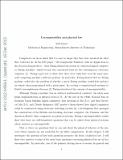| dc.contributor.author | Lloyd, Seth | |
| dc.date.accessioned | 2024-03-26T20:17:02Z | |
| dc.date.available | 2024-03-26T20:17:02Z | |
| dc.date.issued | 2017 | |
| dc.identifier.isbn | 9783319436678 | |
| dc.identifier.isbn | 9783319436692 | |
| dc.identifier.issn | 2190-619X | |
| dc.identifier.issn | 2190-6203 | |
| dc.identifier.uri | https://hdl.handle.net/1721.1/153946 | |
| dc.description.abstract | This paper investigates the role that uncomputability plays in the laws of physics. While uncomputability might seem like an abstract mathematical concept, many questions in physics involve uncomputability. In particular, the form of the energy spectrum of quantum systems capable of universal computation is uncomputable: to answer whether a Hamiltonian system is gapped or gapless in a particular sector requires one to solve the Halting problem. Finally, the problem of determining the most concise expression of physical laws requires one to determine the algorithmic complexity of those laws, and so, the answer to this problem is uncomputable. | en_US |
| dc.language.iso | en | |
| dc.publisher | Springer International Publishing | en_US |
| dc.relation.isversionof | 10.1007/978-3-319-43669-2_6 | en_US |
| dc.rights | Creative Commons Attribution-Noncommercial-ShareAlike | en_US |
| dc.rights.uri | http://creativecommons.org/licenses/by-nc-sa/4.0/ | en_US |
| dc.source | arxiv | en_US |
| dc.title | Uncomputability and Physical Law | en_US |
| dc.type | Article | en_US |
| dc.identifier.citation | Lloyd, Seth. 2017. "Uncomputability and Physical Law." | |
| dc.contributor.department | Massachusetts Institute of Technology. Department of Mechanical Engineering | |
| dc.eprint.version | Author's final manuscript | en_US |
| dc.type.uri | http://purl.org/eprint/type/BookItem | en_US |
| eprint.status | http://purl.org/eprint/status/NonPeerReviewed | en_US |
| dc.date.updated | 2024-03-26T20:09:01Z | |
| dspace.orderedauthors | Lloyd, S | en_US |
| dspace.date.submission | 2024-03-26T20:09:02Z | |
| mit.license | OPEN_ACCESS_POLICY | |
| mit.metadata.status | Authority Work and Publication Information Needed | en_US |
